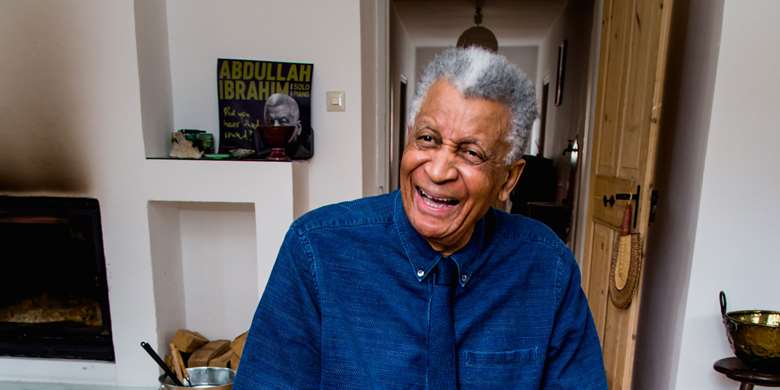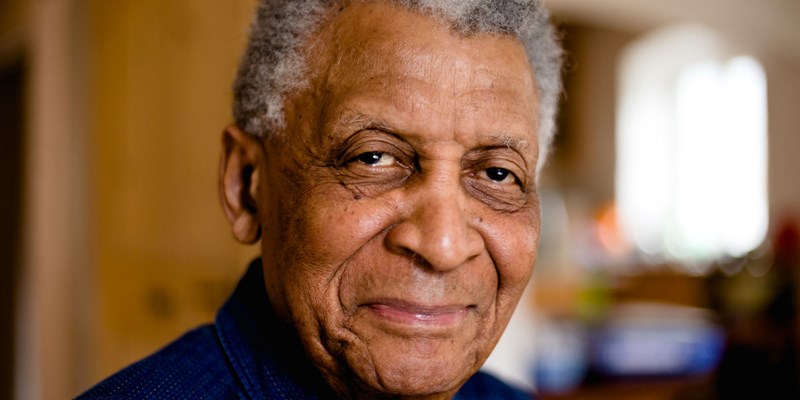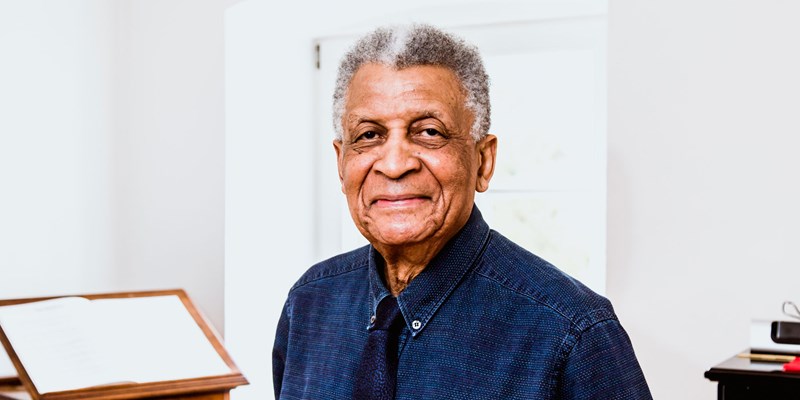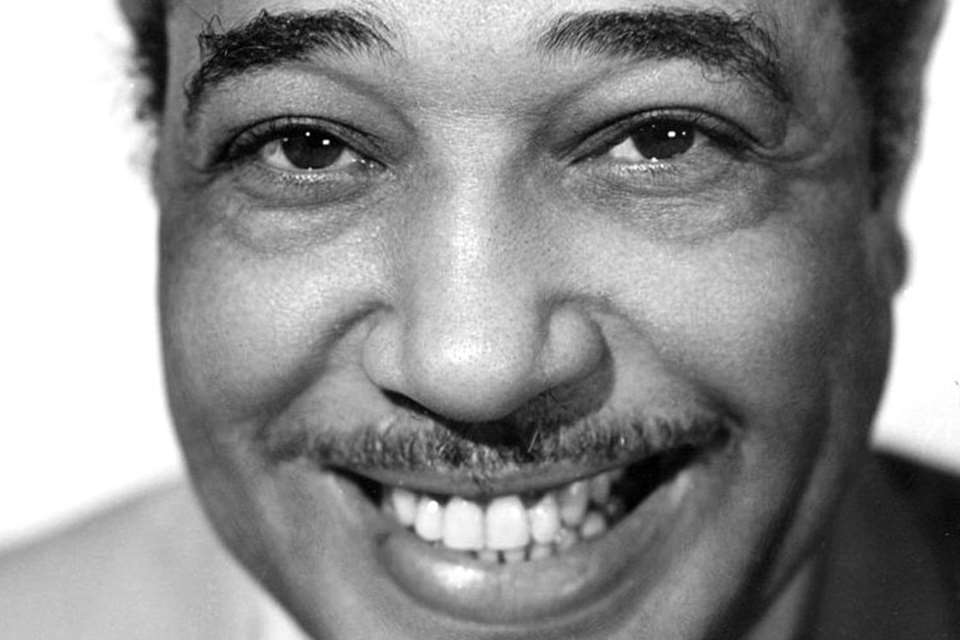"In our music there’s no such thing as a mistake and, actually, maybe in life itself there’s no such thing as a mistake either" | Abdullah Ibrahim interview
Alyn Shipton
Wednesday, October 20, 2021
Alyn Shipton catches up with the South African star to discuss musical roots, life lessons and the memorable time he stepped in for Duke Ellington

It’s a sunny day in Cheltenham. Abdullah Ibrahim is looking ahead to his concert with his group Ekaya in the Jazz Festival tented village. He’s been out and about in the town, and I bump into several fans on my way to this interview who mention he’s been out shopping and taking the air, so as we settle down for a talk he is well acclimatised to the Cotswold spring. A good place to begin seemed to be the backstory to his new album with the same band, The Balance (out on vinyl from Gearbox), which was recorded in London, and which came about after John Cumming of Serious introduced him to the label. It has been some five years since his previous record, and so this one was eagerly awaited.
“Some of the music was written some time ago,” he reflects, “but some of it is new, or at least more recent. What I was after was a recording company that could allow us to do what we want to do. What we’d present to them is the best of our ability, because by the time we’re ready to come to the studio we’ve perfected whatever it is that we’re doing. It’s a blessing for me to have this band Ekaya to play the new pieces in concert. I wanted to record once we’d really worked on them in the live setting. The process of finding a label began about four years ago when John suggested Gearbox and I gave them a call. They told me it was okay and to take my time and get the material together – which I did – and then last November I was in London for the EFG London Jazz Festival, so we came a day early and went into the RAK studios. Normally a recording might take four or five days, but we did this whole album in half a day.”

I assumed this was because being on the road pretty regularly during that gestation period – I’d had a chance to hear the band during this work-in-progress – had really tightened up the repertoire. There was a nod of agreement: “Some of the new pieces are really challenging to play, and that also includes myself! But we have some incredible musicians in the band.”
The person who most stands out to me is the reed player Cleave Guyton, who plays some great alto saxophone on the record, but who has a tour-de-force piccolo solo during the one standard on the album, Thelonious Monk’s ‘Skippy’. Years ago, Ibrahim had told me about the penny whistlers and piccolo players who were a vital ingredient of South African jazz and its street parades, in the early years before the Sharpeville massacre in March 1960 put a stop to them. Cleave’s playing here reminded me immediately of the old records from that time which we’d been discussing back in the day.
“Exactly! The piccolo has been at the forefront of the music, specially in those marching bands which had piccolos along with snare and bass drums. That was a Western influence that came into our domain in Africa, and particularly South Africa, and of course the bass and snare became the basis of the ‘jazz kit’. Yet unlike the drums, which were absorbed into jazz, people hardly play the piccolo any more, but Cleave is an incredible player. Even so, when I did the arrangement on ‘Skippy’ some years ago, nobody wanted to solo on it. They just played the head – not least because Monk’s pieces are incredibly challenging. But when we got to London last year to record, he sighed and said he’d do a solo, but on the condition we only did one take! So that’s what we did and Cleave is at the forefront of driving that song on the record!’
There’s another American musician on the record who’s equally brilliant at inhabiting the South African musical world, and that is tenor saxophonist Lance Bryant. He plays the lead and a solo on Ibrahim’s well-known standard ‘Song for Sathima’ but, while clearly part of the American tradition, his sound reminds me of South African players like Kippie Moeketsi, or Barney Rachabane.
In all my music, though some of it might be instrumental, underneath they are songs first, that are then arranged for instruments
Abdullah Ibrahim“Yes, I spent a minute with him on this, because of course he tried to approach it from a jazz perspective. But it’s a song. So I told him, “Sing a song”. Actually, in all my music, though some of it might be instrumental, underneath they are songs first, that are then arranged for instruments. So Lance was the one who could interpret that song, and the tenor lies perfectly in the range for that melody.”
I suggest to Ibrahim that Bryant has a lot in common with one of the key players in earlier editions of Ekaya, namely the alto player Carlos Ward. There’s a wistful smile: “Carlos comes from dance bands. He’s part of that Brooklyn community with roots in the Dominican Republic and Panama. There’s a very vibrant dance community in Brooklyn, in which you also play songs. And so Carlos approached everything as a song, but in the 1970s and 1980s we stepped up our technical ability. Free jazz made us rethink our approach to the borders in our playing, and Carlos was at the forefront of that movement also. And he is typical of what I try to do with Ekaya, because my band say to me: ‘When we come to play with you we are musicians, and not just sidemen’. I don’t believe in the idea of a ‘sideman’.”
I have a feeling that one aspect of this band feeling rooted in the Brooklyn dance halls, and in playing songs, is that the tempi are really dance tempi – mainly a bit slower than other groups might take them, but respecting the way people move to the music on the dance floor.
“This is one reason,” says Abdullah, “why I don’t announce the names of numbers between tunes during a concert. I want people to make up their own minds, not to give them information like, ‘When I was in New York City I did so and so…’, so with a piece on this record like ‘Jabula’, which means ‘joy’, I want it to touch people and maybe make them feel like dancing. Yet at the same time the melodic line is complex. Musicians can struggle with it! They don’t have that experience playing elsewhere – except maybe with the Basie band as it now is. Cleave, Lance, Andrae Murchison and Marshall McDonald, they’re all members of the Ellington or Basie band, or previously the Lionel Hampton band. So they bring that dynamic to Ekaya, but I always have to remind them that we have to use very subtle degrees of playing loud or soft. It’s a trick that I learned from Ellington.”
I have to ask: Didn’t he once sub for Ellington with his orchestra? There’s a massive guffaw – “Oh, it was a disaster! I thought I was doing pretty well, until we had a break and Johnny Hodges came over and said, ‘You should play this, on the piano’ and he demonstrated something I was supposed to have done. I knew all the songs from records, and I knew there’d be no sheet music, because Max Roach had told me beforehand that when he subbed in the band there were no drum parts, and in any case why would Ellington have piano parts for himself when he wrote so much of the repertoire? I’d been comping behind the band on ‘Things Ain’t What They Used To Be’ when suddenly I saw them all looking at me, despite the fact that I thought I was pretty much in the loop of things. But what happened was that in a concert there was a change in the way they did the solos, so there was an eight-bar vamp between each soloist, but on the record that wasn’t there. So, as it went on, I’d gone so far ahead it was embarrassing! It was a learning experience. I remember a piece called ‘Sunday the Seventh’, which is a blues in 7/4. Ellington wanted me to arrange it. Every year when I’d meet him he’d say ‘Have you done it yet?’ And I’d say ‘No’. So, finally, he asked me why and I told him I was afraid I’d make a mistake. He said, ‘If you do then just write another one…’ And what I learned from that is that in our music there’s no such thing as a mistake and, actually, maybe in life itself there’s no such thing as a mistake either.”
Picking up on that point of there not being any music, I wondered if Ibrahim still dictates all his pieces to the band so as to avoid giving them scores to work from. “Oh, sure. I say to them, ‘This is only a guide’. But there are many possibilities within the arrangements and I suggest that maybe they try another approach, another scale, or find another tonal centre. So all my music is a living organism in that sense.”
I wonder if this affects a piece on the new record like ‘Tuang Guru’, which was on the Water From An Ancient Well album back in 1986, but which now sounds quite subtly different. “I think,” he says reflectively, “it’s drawn from our tradition, our cosmology, the way we approach things. And, actually, in Japanese culture too. They have a principle of asymmetry, particularly in visual art, because if everything is symmetrical then the observer has nothing to do. If you present a fait accompli, then the mind has nothing to do, but if you don’t then you stimulate the brain. As Ellington said, the most important part of music is listening to it.”

Coming back to The Balance, and listening in depth to the piano solo tracks, they seem to me to have a wistful, almost melancholic atmosphere. “They’re all improvisations. The three piano pieces were totally improvised. I’m very happy that for you, that is what it evokes, because for me that’s mission accomplished. Once I’ve struck the note, there’s nothing I can do. So what I need to do in these solo pieces is to make my intentions so sincere, that it communicates, but there is no past, no future, there’s only now. If we can convey that moment, the listener is drawn into whatever they might experience. You might think it’s wistful, other people might think it’s rubbish! I can only say I did my best!”
Duke said that in some ways he preferred to work with unschooled musicians because it could unlock their sense of originality
Abdullah IbrahimSo what’s next? Will the band be on the road more, promoting the album? “Well we have a marketing shelf life to contend with, but the music is perennial. That said, we have a lot of new projects in place with the band and a big thing coming up with a philharmonic orchestra. This is interesting in itself, because we have to approach the players and think about their capacity for this music. My collaborator, the late Steve Gray, who was one of the great arrangers, worked with me a lot with orchestras. And he demonstrated that there are differences of approach. For example, if you write a set of eighth notes, a jazz musician will naturally syncopate them. But the classical player would just play them evenly: ta-ta-ta-ta-ta-ta-ta-ta. So I have to think how to overcome that. Steve used to do it by saying: “OK, write triplets.” And that sort of worked, but it is a totally different approach. And then another idea is that you don’t impose on people what it is that they are supposed to do. (I’m giving away all my secrets here, you realise!?) But you give musicians a chance to say, ‘I did it!’ Of course, Duke said that in some ways he preferred to work with unschooled musicians because it could unlock their sense of originality.”
So, is this orchestral music his focus for the future? “In South Africa at the moment there’s an amazing generation of young classical musicians. For instance, there’s one young bass player who has translated all the Bach solo cello suites to the bass. Another young man from South Africa has been studying classical conducting in Milan. So, with them, we are creating my own philharmonic orchestra and I know that they will discover there’s potential beyond just ‘reading’ music. It’s based in Johannesburg and it will spark their potential in a city where there is truly so much going on, both on the surface and also deep underneath!”
This interview originally appeared in the August 2019 issue of Jazzwise magazine. Never miss an issue - subscribe today
